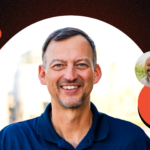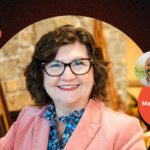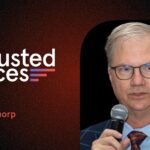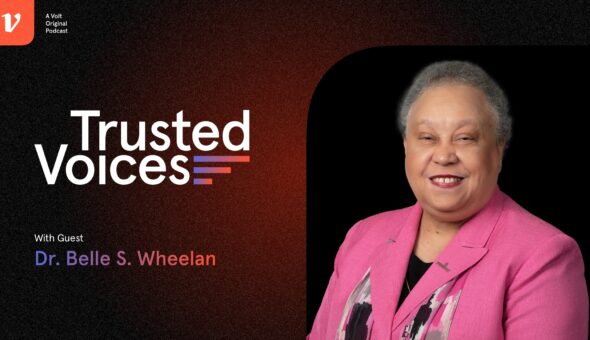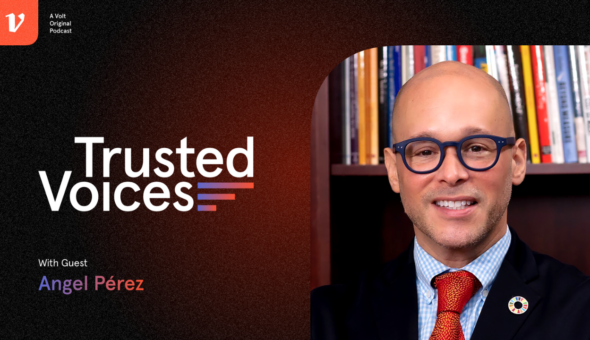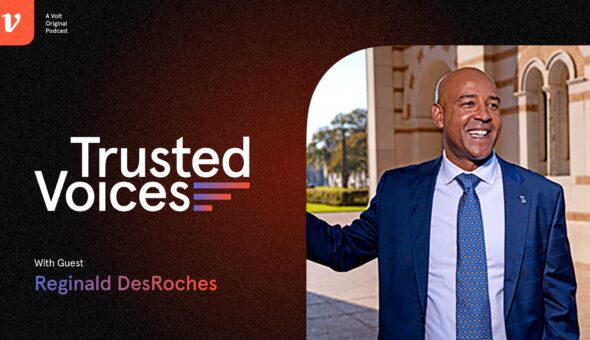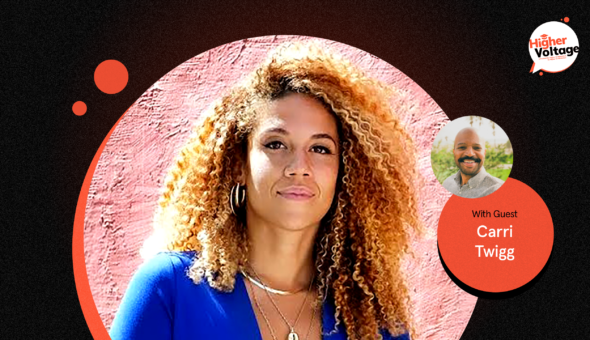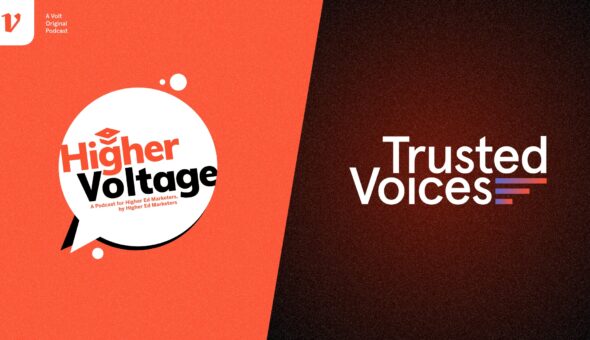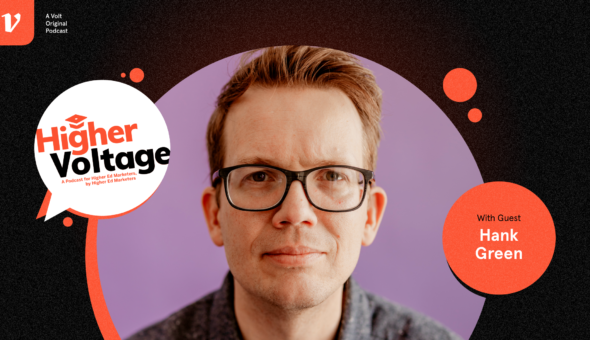Teresa and Erin are back to recap their conversation with Valerie Sheares Ashby, president of University of Maryland, Baltimore County. Along the way, they discuss the skills necessary for effective leadership: the ability to make people feel heard, the art of a pivot, and the importance of knowing your strengths and the strengths of those around you.
Read the full transcript
Erin Hennessy:
Hello and welcome to part two of the Trusted Voices Podcast. I’m Erin Hennessy alongside Teresa Valerio Parrot. After each episode, we take some time together to digest our conversation with our most recent guest, and come back to share what we’re taking away from that conversation, what we’d like to learn more about and resources we found helpful in thinking about these topics. If you haven’t had a chance to listen to our conversation with President Valerie Sheares Ashby of UMBC yet, I encourage you to scroll back in your feed and hit play. You won’t want to miss this conversation. Teresa, what’s sticking with you in the days and hours after our conversation with President Sheares Ashby.
Teresa Valerio Parrot:
It was so refreshing how comfortable she is in her leadership. She has figured out who she is and she has built a community around her and, I’m sure we’ll come back to that topic, so that she is able to be her best self and to do so with intentionality. And I was just so impressed with how she frames knowing what she’s good at and what she’s not. And I wish that we were able to pass that reflection onto so many different presidents because it was fantastic to hear. How about for you?
Erin Hennessy:
No, I agree. And as we were having this conversation yesterday, my first thought was I hope everyone has a chance to hear her express her vision for leadership as well as her joy for the work because just you and I talked after our recording, I don’t go in for these kind of metaphors, but it filled my cup in a way that was just, I didn’t realize how much I had needed it. And particularly to see, and this is I think more about me than about the president, but to see a woman be so confident and self-assured in her leadership and willing to say, this is what I know, this is what I don’t know, and I know I can figure it out, but to also see a higher ed leader really say, I can’t do it all on my own, and so I’m going to reach for mentorship and I’m going to reach for coaching and make the most of that in my career. And then, also make sure that those who work with me have that opportunity as well.
Teresa Valerio Parrot:
I was impressed that she was willing to ask for what she wanted, and that was everything from resources to new opportunities to promotions to whatever it was. And that’s one of those things that I literally just got the chills thinking about that, hearing her say, this is what I want. Some of this came by surprise, and I was approached for it, and in other opportunities I said, I wanted this, and that strength and that power I thought was just beautiful. And as you know, at the end when we signed off, we did exactly what you talked about. I gushed for a bit and told her, you and I both have talked about how this has been kind of a tough week in some ways. And we rolled into the podcast ready to have the conversation, and it suddenly felt like the next day and a half of the week were doable in ways that we both were going to get through, but suddenly we were doing it with our own passion and enthusiasm because she had shared those with us. It was just inspirational.
Erin Hennessy:
It was, and we didn’t really dig into it, but I think have a link in our show notes to a conversation that she had with Doug Letterman of Inside Higher Ed and Bridget Burns. And in that conversation, I was so struck about how she talked about, I don’t want to call it work-life balance, but about what she needs for herself on a personal front to come to her work life as a full and authentic person. And she sort of touched on that briefly in our conversation, but I encourage folks to go read, either watch that interview or read the transcript of it because she really talked about what she needs in her personal life in terms of rest and in terms of exercise and in terms of music, and the things that really fuel her personally, so that she is at her best professionally.
And I think particularly coming out of this pandemic experience, so many of us are grasping for how to rebalance and how to refuel in our personal lives because we know that we’re coming in a little rundown and a little tired out. And I’ll speak for myself, a little uninspired at times because of what we’ve all been through in the last few years.
Teresa Valerio Parrot:
And are still going through in many cases, right?
Erin Hennessy:
Yeah, yeah.
Teresa Valerio Parrot:
And I think that was important. Do you mind if I switch gears for a second?
Erin Hennessy:
I was going to say it’s probably enough gushing, and we should probably talk about some substance, but my gosh. I could gush for-
Teresa Valerio Parrot:
It was fantastic.
Erin Hennessy:
Yeah.
Teresa Valerio Parrot:
And this is what we talked about who can instill trust? That’s really the point of this podcast for the industry, and I appreciated how she advocated. These are my words, in no way, shape or form did she say this. She advocated against vision statements that are empty. One of the things that I did in my graduate program is we had to look at vision statements and mission statements and try to find substance in them. And that was a tougher project than you all might think, and that’s something you all might want to do. Well, if you have a little bit of time just to poke around different websites for institutions, there are a lot of mimicry-based vision and mission statements, and I know that she inherited it, but she’s owning it. And there is nothing disingenuous about the way in which UMBC thinks or talks about itself, and I like that.
Erin Hennessy:
Yeah, and you’re absolutely right. I think about the thing we saw going around on Twitter a couple of weeks ago where somebody asked ChatGPT to write taglines for universities, and A, they were all alike, and B, I know I’ve seen half of them on institutional websites. But the way in which President Sheares Ashby took that vision statement and made it very clear to us that mimicry-based one, it is a vital, relevant and often referenced document, and then also broke it down to make it real and not just some lofty flighty thing that we put in the honor roll of donors and we have on the website and we share with middle states. But it is a thing that is really a guiding document for the university. And I think so few institutions really have that kind of A, short, clear, concise vision, and B, have really figured out how to make it real and livable for everyone in their university or college community.
Teresa Valerio Parrot:
And I also appreciated how she wasn’t trying to buy into the prestige game that everybody else is playing into. So, she definitely had prestige markers that she was talking about for the campus, but those were realistic and inspirational for UMBC. They weren’t trying to be what every other institution is. And I always appreciate when successes are able to be defined for that institution to make it better rather than just trying to be what everybody else is trying to achieve.
Erin Hennessy:
Yeah. I mean, you and I talk a lot about the pros and cons of really long-serving presidents at various institutions, and I think one of the luxuries of having her predecessor there for so long is that UMBC is really comfortable in its skin. UMBC knows exactly what kind of institution it is, exactly what kind of student it’s looking for, exactly what kind of programs it should be offering and in which it excels. And unlike a lot of institutions we see who are playing those ranking games and in other ways, making leadership selections based on who they want the institution to become, UMBC is exactly what it is, and it is exceptional in that space. It knows how to define excellence for itself, and it isn’t trying to be all things to all people. And I think the alignment between that sort of personality I’ve just given the university and President Sheares Ashby’s personality is just, it’s kismet. It’s a perfect alignment.
Teresa Valerio Parrot:
I agree. Other things that you had as takeaways? I have two more, but I want to give you a chance to.
Erin Hennessy:
Well, I mean, I’m working on my logo for the Valerie Sheares Ashby fan club, so I’ll have drafts for you to look at.
Teresa Valerio Parrot:
I would appreciate that.
Erin Hennessy:
I really thought it was, to sort of pull way up, she’s a phenomenal communicator and she brings people in and she makes people feel that they are hearing from someone who is authentic, who believes the things that she says, and who has a really interesting way of approaching questions, not always answering all those questions.
Teresa Valerio Parrot:
Yes. That was my takeaway yesterday.
Erin Hennessy:
I know it was, and I wanted to tee that up for you. But also making me feel like, making you feel like, that this was an important conversation and that she was happy to be part of it. You can also see what an exceptional professor she is. I’m not saying I could pass her chemistry course, but I definitely-
Teresa Valerio Parrot:
Didn’t you want to take it though?
Erin Hennessy:
No.
Teresa Valerio Parrot:
I was like polymers, let’s go. I’m ready.
Erin Hennessy:
But I mean, you could see how she could draw somebody into something that is maybe not a topic they’re familiar with or didn’t realize they were interested in. So, I’m very envious of students who got to be in her classroom.
Teresa Valerio Parrot:
As we continue to go through these episodes, we’ll hear all of the 500 majors I had in college, but my first major was pharmacy. And I wonder if I would’ve stuck with pharmacy, if I would’ve had chemistry professors like her, because she just made me want to learn and she made me want to be a part of what she was talking about. But I do want to pivot to something that you talked about when you and I were talking yesterday. I said, “She’s brilliant in answering and not answering questions, and at the end, you feel as if you were heard.” And that’s a skill and a talent, that’s not a cut.
That is to say that she is a really good example of someone who can pivot. And since we teach that skill to others, when you see it, game appreciates game, right? And she did such a beautiful job of sometimes not really answering our questions but getting us to new places that were really excellent. And I hope that other presidents are listening to that. Maybe not those that we have on our podcast, but others are listening to that because sometimes that’s part of relationship building and that’s a safer way for you to get away from a question that might have some vulnerability for you. She did that beautifully.
Erin Hennessy:
Yeah. Yeah. What’s your last one?
Teresa Valerio Parrot:
The last one is she was talking about, again, going back to the fact that she’s comfortable in her own leadership, that she is willing to not accept something because it might be good for someone else. And I feel like there is this hierarchy of when you know are absolutely the best leader that you can be. I think that’s kind of the top of whatever that pyramid is, is that you understand that sharing opportunities is the ultimate form of leadership.
Erin Hennessy:
Yeah. Yeah, and we both, I think mentioned it a little bit in that conversation, but just noting the difference between a leader who is open to opportunities as they come and sort of matches them up with their strengths and interests and things like that. And the person who has set the intention early in their career to say, “This is what I want at the end.” And I’m not saying one is better than the other, but I think one provides more opportunity for joyful leadership, where it’s about, look at where I’ve landed, look at the opportunities I’ve come across, as opposed to how am I doing on reaching that goal? And do I feel like I’m moving fast enough, and do I feel like I’m… It just feels more serendipitous and it feels more joyful and it feels less, I don’t know, sort of not contrives the wrong word, but sort of-
Teresa Valerio Parrot:
Formulaic. Yeah.
Erin Hennessy:
Yeah, something like that. And again, it’s not a criticism either, it’s just a very different approach. And we’ve talked about the person who sets the intention to be president at the end and gets there and goes, God, this isn’t what I thought it was. I don’t like it. I’m not good at those-
Teresa Valerio Parrot:
And we see a lot of those. Yeah, we see a lot of those.
Erin Hennessy:
Yeah, because as we said, the job isn’t what the job was when a lot of these presidents were assistant professors. I’m sort of charting their early careers, it just isn’t the same anymore. So, I think it’s just something that was really interesting to see and absolutely emanates from the president in her conversation with us.
Teresa Valerio Parrot:
I thought she was fantastic. And as we talk about who is it that we want to be hearing more from, who is it that we can learn from? There are so many people out there who are becoming better known but aren’t the usual suspects maybe yet. And I would put her on that list because I think she is one to watch. She was just delightful.
Erin Hennessy:
Yeah, agreed.
Teresa Valerio Parrot:
Okay, and on that note, we’ll wrap up episode four. Thank you for joining us again on Trusted Voices. We’ll look forward to being back in your feed in a couple of weeks with a new guest and continuing conversations about higher education leadership and communications. Until then, on behalf of Erin, our thanks to DJ Hauschild, Aaron Stern and the Volt Team for another great episode. Thank you.
